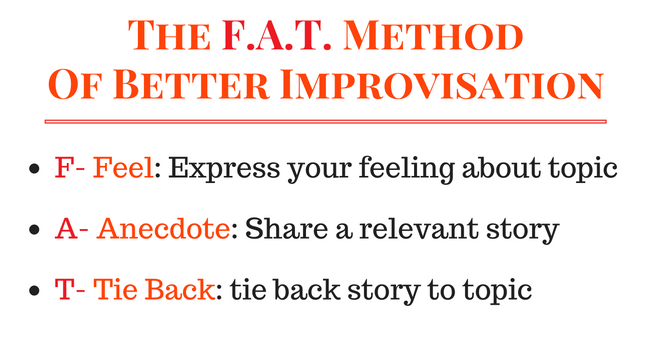An Impromptu speech is a talk that you give on the spot with no preparation.
The speech could be as professional as a project update or as casual as a toast at a wedding. Either way, you are expected to say something smart, witty and charming.
While it might feel like torture even to the most second C-level executive, giving an extemporaneous speech is the mark of an excellent communicator and leader.
Impromptu Speech Situations You Must Be Ready For
It’s not how you handle yourself when you are prepared, that demonstrates your leadership, it’s how you handle yourself when you are least prepared. Most of the presentations you give will be prepared, yet some will not, and these unplanned events will have a bigger impact on your personal brand.
Here are just some examples of them
- Introducing yourself at networking events.
- Filling in for a late speaker.
- You are asked to give a toast at a company party.
- You get asked a question you did not prepare for while on a panel.
- Job interview questions from left field.
- You are interviewed by a reporter.
- You get pulled into a meeting to give an update.
- There is unexpected push back on your ideas at a company meeting.
- Say a goodbye speech to a departing employee.
- Your college refers to you in the middle of a presentation for input.
The Best 3 Impromptu Speech Tips I Ever Got
The first company I interned for during my college years threw me a goodbye party. I was happy until the manager asked if I had a few words for the team.
Then I opened my mouth, and gibberish came out. It sounded like I was speaking in tongues, “Ahh, Ahh, blah, blah, blah…”
Later, my manager at that time gave me three tips about talking on the spot that I carry to this day: “Stick to the truth, share from personal experience, and practice out loud.”
1. Stick to the truth. No need to embellish, exaggerate or stretch the truth. The truth is always good enough.
For example, if you feel happy to have your colleagues in a meeting, then don’t say that you feel “super excited.” Saying that you feel happy is good enough. At least when you tell the truth, you will be authentic.
Now, telling the truth does not mean that you divulge company secrets. You stick to your truth at the moment. If you don’t know, then you say you don’t know; if you are not sure, then you say you are not sure.
Sticking to the truth will save you from a lot of mental anguish.
2. Share from personal experience. When you speak from personal experience, then you are referring to things that you intimately know. No need to research, no need to investigate, and no need to memorize anything.
When in doubt about what to say, just tell a story from your past related to the situation. That will make your contribution unique and valuable.
For example, someone asks you about the future of self-driving cars. Instead of making up stuff, just talk about the time you were in Mountain View, and you saw one of the Google’s self-driving cars for the first time.
Wait, you never saw that. No problem. Talk about the last time you were talking with your spouse about self-driving cars.
Wait you never did that. No problem. Talk about the first time you heard about self-driving cars.
You get the idea here. No need to make up anything, just look back in your memory to the closest experience with the topic and share that.
3. Practice out loud. Thinking on your feet is like dancing, you can’t learn it by thinking about it.
There are two ways to practice impromptu speaking:
1. On your own. Choose a different random topic every day and speak out loud about it. What you say does not have to be perfect, or eloquent, or enlightening. The important thing is to speak out loud. I do this when I am stuck in traffic. I pick a random topic and then I just speak on it for a minute or so. Don’t overdo it. Just once a day is enough.
2. Speak in a group. Practicing in front of a group and getting professional feedback is the best way to learn impromptu speaking. I know that this option is harder than practicing on your own for many reasons. Not finding the right group, not finding the time are just a few. However, it is not impossible. You can try out different speaking classes or join a Toastmasters group in your area until you find one that resonates with you. It will be worth it.
Quick and Dirty Impromptu Formula You Can Use Right Away
In an impromptu speech, the structure king. Without a present and practiced structure, you will ramble on and make no point at all. In fact, the structure will be the king, queen, and general combined to martial and lead your content in a concise and relevant way.
There are many other formulas that I use for impromptu speaking, however, here I want to share with you an excellent one.
It’s called FAT.

F = Feeling
Share your honest feeling about the topic, circumstance or person. If you feel excited to be there then, that’s the impression that you share (remember to stay close to the truth)
A= Anecdote
Share a relevant story. Most of the time, I share my first experience with the topic. For example, if it’s a car, then I share a story about my first car in college. If it’s a person, then I share my first experience meeting the person. It does not have to be that way.
T = Tie Back
After you are done with the anecdote, make sure you tie it back to the topic you are talking about. Example, if you are doing a toast for a departing coworker, and you share the story of the first time you meet her, you can tie back by saying, that after that event, you knew that she was destined for big things and that she will be missed when she leaves.
When you get asked to speak about someone or something, you can always rely on the FAT formula.
Here is an example of an impromptu speech using the FAT method.
Scenario: you are asked to thank a group of interns that worked with your department for the summer.
F: Feeling
I want to thank Michael, Amey, and Kira for working with our department over the summer. Their work is greatly appreciated, and I don’t know how we would have done it without them (only say it this way if it’s the truth).
A: Anecdote
I remember your first day. You were all quiet, taking notes and probably thinking oh my god what a mess. Then surprised us all by your initiative and how quickly you learned. With your help, we caught up on our financial audit.
T: Tie back
We were so thankful to have you this summer and wanted to wish you the best in your academic career next year. I know some of you will be graduating, and I look forward to hearing from you. I hope you would consider coming back to work with us 🙂 Good luck!
Ok, that was the FAT method. Easy right?
You don’t have to remember any content, all you have to remember is a structure. The takeaway is that it can be used for many different scenarios. Weddings, eulogies, goodbyes, updates, answers, etc.
Conclusion
Extemporaneous and Impromptu speaking is a great skill to have. I say a skill because it is something you learn and develop over time. Impromptu speaking is something you get good at with practice and feedback. Start practicing today and leave an impromptu comment below.






